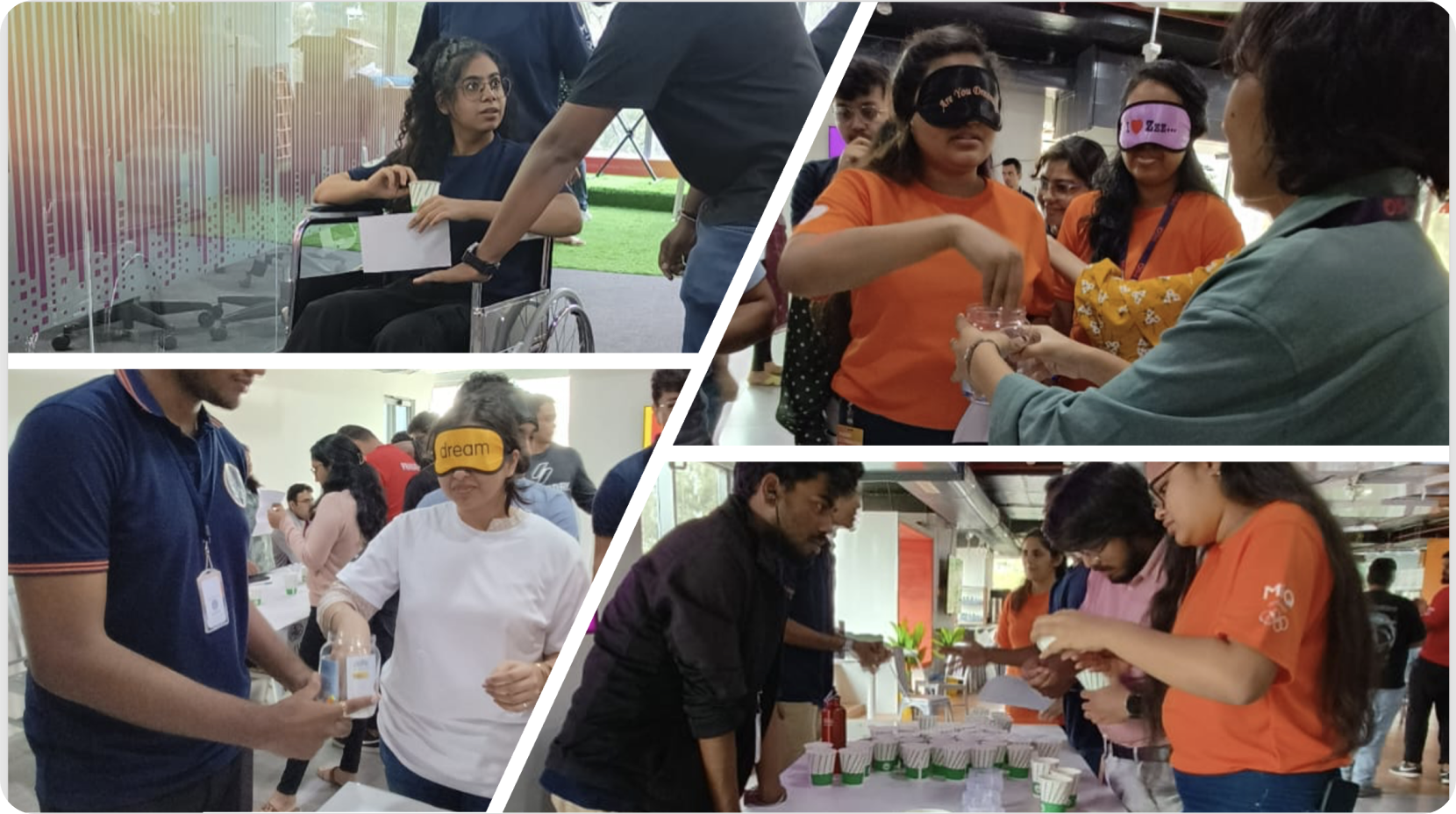
About the Session
Disability Simulation games aim at giving all the participants a better understanding of the real-life experiences of persons with disability and help to generate empathy and inclusive attitude towards persons with disability.
There are a variety of games customized for different disability types. All of the activities require the participants to use the sense organs which a person with the respective disability uses along with the use of assistive technologies or devices.
Agenda of the Session
- Awareness Games for visual impairment: Includes activities like cracking a message written in Braille and identifying objects with a blindfold which exposes the participants to visual impairment.
- Awareness Games for Hearing Impairment: Setting up a sign language booth and solving a crossword in Indian Sign Language are some of the examples of the activities included here. This is a great learning experience for the participants and enables accessibility for persons with hearing impairment at the workplace.
- Awareness Games for Neurodiversity: While the awareness around Autism has already started to spread, neurodiversity comes with a wide set of disabilities including intellectual and learning disabilities as well. Games like solving the jumbled word puzzles and recognizing the words seen through mirror images helps the participants gauge the struggle of neurodivergent minds.
- Awareness Games for Physical Disability: There are activities like the Wheelchair Maze Race which makes the participants experience the usage of the assistive device as well as the challenge faced by the wheelchair users.
Another activity called the Rubber Band Game takes the participants through an experiencing what someone with amputation in the forelimbs faces.

Past Workshops
Corporate Clients









Corporate Clients
Trusted By
Simulation Games workshop to increase disability awareness
Brief Overview on the simulation games workshop
The best way to learn in today’s day and age is through practical activities. This is exactly how the Simulation Games workshop by Atypical Advantage helps you understand the differences and experiences of various disabilities. Interactive games and activities help in gaining a deeper insight into how people with disabilities perform daily tasks and the subsequent obstacles they face. It is a dynamic workshop to increase awareness and let participants empathize with people with disabilities.

Importance of the simulation games workshop
Simulation games workshop is a crucial step towards highlighting the challenges people with disabilities face on a daily basis. To help foster an inclusive and accepting environment, participants need to understand the intricacies of disabilities by experiencing the hindrances first-hand. This workshop gives participants an opportunity to step into the shoes of people with disabilities and in turn adopt a more inclusive mindset. By experiencing simulated disability scenarios, participants gain insight into the accessibility and accommodation needs essential for creating an inclusive society.List of Games
The Simulation games workshop includes a variety of experiences, each designed to simulate different aspects of disabilities. Here's a list of games for you to understand the experiences you can expect, although the games offered evolve over time, so feel free to reach out to us for the latest details.

1. Visually Impaired Awareness Games
- Crack the Message Written in Braille: Participants decode a message in Braille, enhancing their understanding of visual impairment.
- Identify by Touch: Blindfolded participants must identify objects by touch, simulating the experience of visual impairment.

2. Awareness Games to Simulate Hearing Impairment
- Learn Sign Language Booth: Participants learn basic sign language phrases from a Deaf host, promoting awareness of hearing impairments.
- Sign Language Crossword: A game that combines learning Indian Sign Language with the fun of solving a crossword puzzle.

3. Autism Awareness Games
- Mirror Drawing: Participants draw while looking into a mirror, simulating the perception challenges faced by individuals with dyslexia.
- Jumbled Words: This game illustrates how a typically written message may appear to a person with autism.

4. Physical Disability Awareness
- Wheelchair Maze Race: A teamwork game where one guides a blindfolded partner in a wheelchair through a maze.
- Rubber Band Game: Simulating finger amputation, participants sort colored beads into cups, challenging their dexterity.






